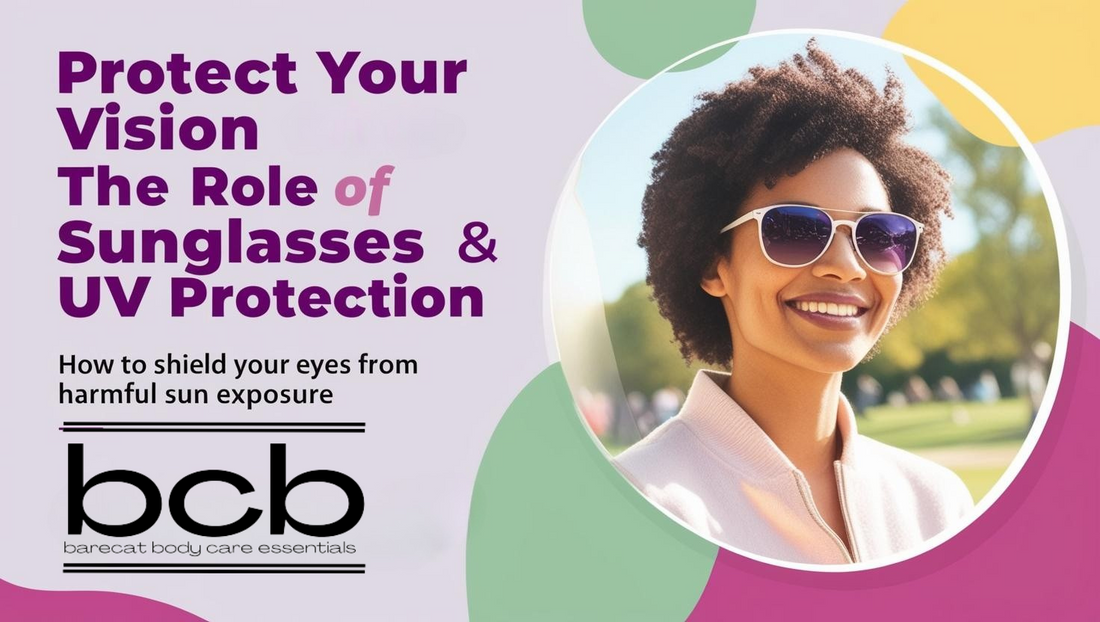
Protegiendo su visión: el papel de las gafas de sol y la protección UV
Compartir
Por qué es importante la protección UV para tus ojos
Al igual que tu piel, tus ojos pueden verse afectados por la exposición excesiva al sol. Los rayos UV del sol pueden causar daños a largo plazo, aumentando el riesgo de cataratas, degeneración macular e incluso cáncer de ojo. Usar gafas de sol y tomar otras medidas de protección puede ayudarte a mantener tu visión protegida.
Cómo afectan los rayos UV a tus ojos
La exposición a la luz ultravioleta (UV) puede provocar varios problemas de salud ocular, entre ellos:
✔ Cataratas : opacidad del cristalino del ojo que produce visión borrosa.
✔ Degeneración Macular : Daño a la retina que afecta la visión central.
✔ Fotoqueratitis : una afección dolorosa similar a una quemadura solar en el ojo.
✔ Pterigión : un crecimiento en la superficie del ojo causado por la exposición a los rayos UV.
✔ Cáncer de piel alrededor de los ojos : la delicada piel alrededor de los ojos es propensa al daño solar.
Proteger los ojos con gafas de sol y otros hábitos de seguridad solar pueden ayudar a prevenir estas afecciones.
Cómo elegir las gafas de sol adecuadas para la protección UV
No todas las gafas de sol ofrecen el mismo nivel de protección. Busque estas características al comprar unas nuevas:
1. 100% de protección UV
Tus gafas de sol deben bloquear el 100% de los rayos UVA y UVB para proteger tus ojos de la radiación dañina.
2. Lentes polarizadas
Las gafas de sol polarizadas reducen el resplandor de superficies como el agua y las carreteras, lo que las hace ideales para conducir o realizar actividades al aire libre.
3. Marcos envolventes o grandes
Las lentes más grandes brindan una mejor cobertura y protegen la delicada piel alrededor de los ojos de la exposición al sol.
4. Los lentes más oscuros no significan mayor protección
Los tonos más oscuros no siempre ofrecen mejor protección UV. Revisa siempre la etiqueta de protección UV al 100 % .
5. Gafas de sol graduadas
Si usa anteojos recetados, considere adquirir lentes con protección UV o gafas de sol con clip para colocar sobre sus anteojos habituales.
Remedios naturales para aliviar la irritación ocular causada por el sol
Si has estado demasiado tiempo al sol y sientes los ojos irritados, prueba estos remedios naturales :
1. Compresa fría
Remoje un paño limpio en agua fría y colóquelo sobre los ojos durante unos minutos para reducir la inflamación y la irritación.
2. Rodajas de pepino
Las rodajas de pepino pueden proporcionar un efecto refrescante, ayudando a calmar los ojos cansados y expuestos al sol.
3. Gel de aloe vera
Aplicar gel de aloe vera alrededor de los ojos (no directamente en ellos) puede ayudar a reducir el enrojecimiento y la irritación.
4. Mantente hidratado
Beber mucha agua mantiene los ojos hidratados y reduce la sequedad causada por la exposición al sol.
5. Descansa tus ojos
Evite las pantallas y las luces brillantes durante algunas horas después de una exposición excesiva al sol para permitir que sus ojos se recuperen.
Tratamiento médico para el daño solar en los ojos
En casos graves de exposición al sol o daño UV a largo plazo, puede ser necesario tratamiento médico:
✔ Lágrimas artificiales : las gotas lubricantes para los ojos pueden aliviar la sequedad y la irritación.
✔ Gotas antiinflamatorias : recetadas para ojos con quemaduras solares graves (fotoqueratitis).
✔ Cirugía : Es posible que se necesite cirugía de cataratas o tratamientos con láser para el daño UV a largo plazo.
Si experimenta dolor persistente, pérdida de la visión o sensibilidad extrema a la luz después de la exposición al sol, visite a un oftalmólogo de inmediato.
Consejos adicionales para la protección ocular
✔ Use un sombrero de ala ancha : un sombrero proporciona sombra adicional y reduce la exposición directa al sol.
✔ Evite el sol del mediodía : los rayos UV son más fuertes entre las 10 a. m. y las 4 p. m.
✔ Use lentes de contacto con protección UV : algunos lentes de contacto tienen protección UV incorporada.
✔ Use gafas de sol incluso en días nublados : los rayos UV penetran las nubes y siguen representando un riesgo.
Reflexiones finales
Tus ojos necesitan protección contra los dañinos rayos UV, al igual que tu piel. Usar gafas de sol de alta calidad, seguir los consejos de protección solar y usar remedios naturales para la irritación pueden ayudar a mantener la salud ocular a largo plazo. Si experimentas problemas de visión debido a la exposición al sol, busca atención médica de inmediato. ¡Cuida tus ojos hoy para un futuro más brillante!
